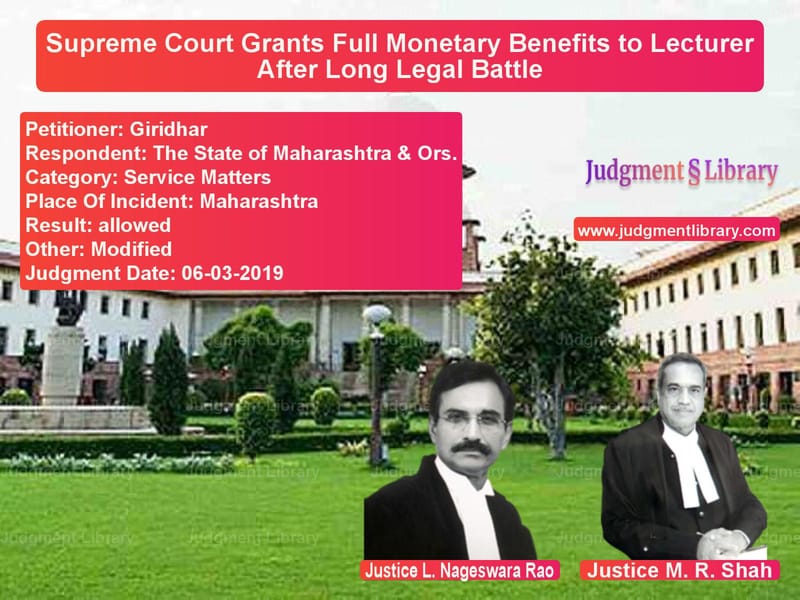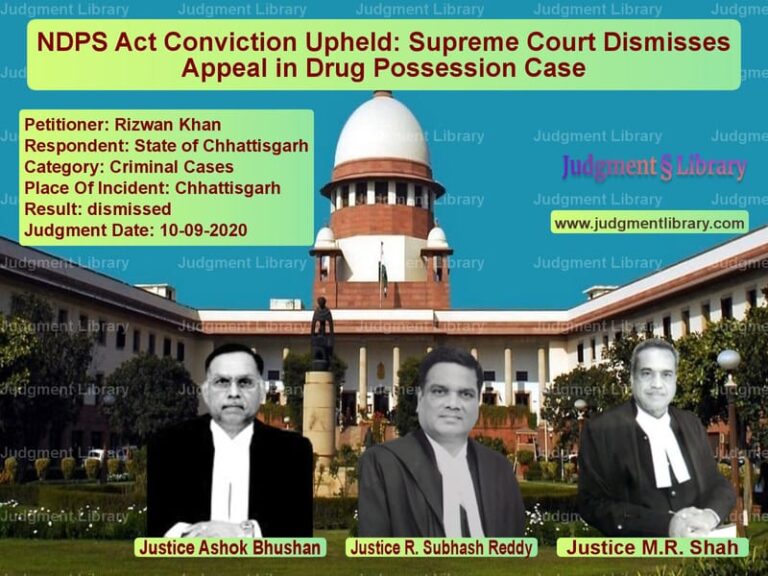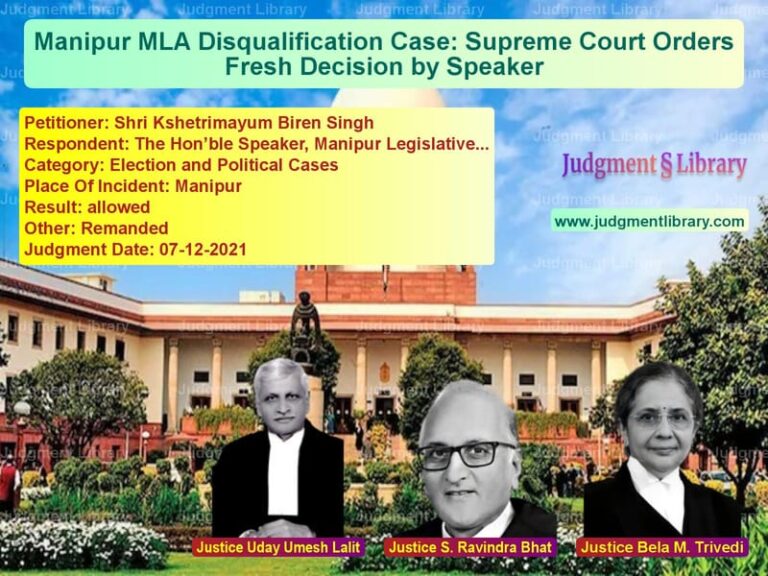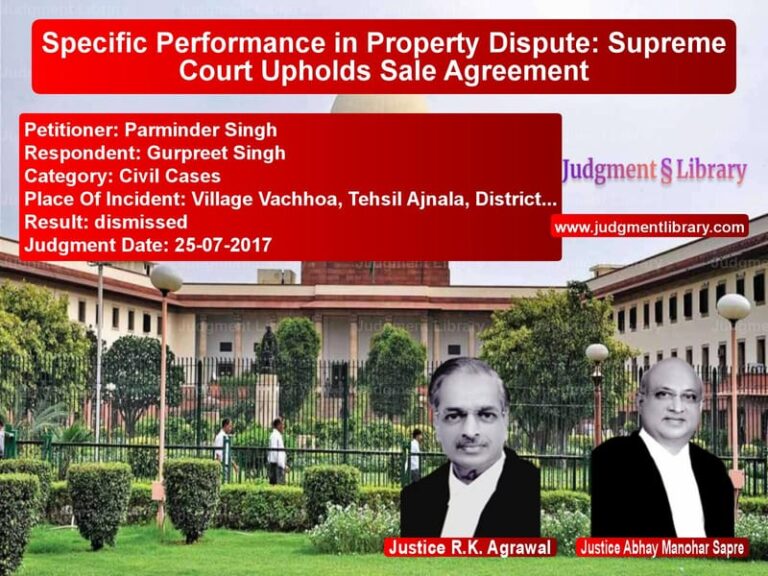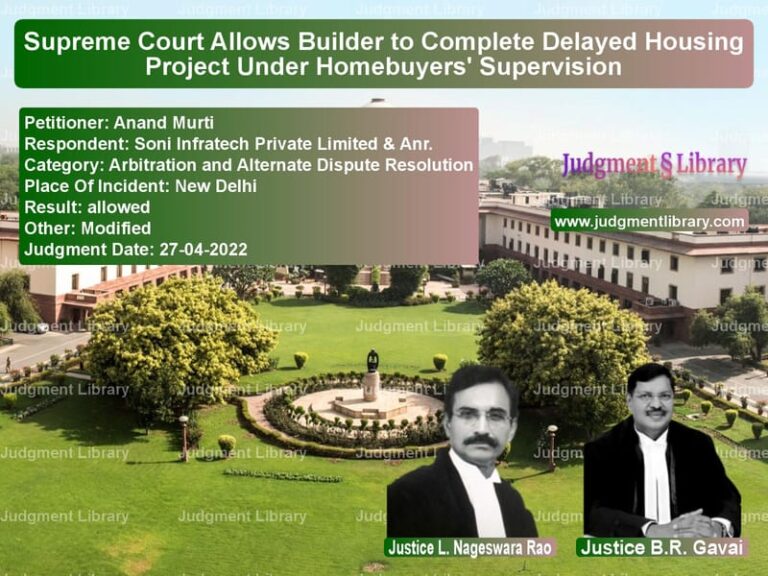Supreme Court Grants Full Monetary Benefits to Lecturer After Long Legal Battle
The Supreme Court of India, in the case of Giridhar vs. The State of Maharashtra & Ors., delivered a crucial ruling regarding the entitlement of a college lecturer to monetary benefits from the date of his first appointment. The case revolved around whether the petitioner, who was appointed on a reserved post but later regularized, should be granted financial benefits from his initial appointment date or from a later period as decided by the High Court.
Background of the Case
The appellant, Giridhar, was appointed as a Lecturer in Chemistry on December 26, 1989, at Respondent No. 4 College. His appointment was made against a post reserved for Scheduled Tribes (ST) because no candidate from the reserved category was available.
As per a Government Resolution dated January 25, 1990, if reserved category candidates were unavailable for a post, persons from the general category could be appointed temporarily. Advertisements had to be issued for five years to find a reserved category candidate. If, after five years, no candidate applied, the post would be de-reserved.
Since no ST candidate applied, Giridhar continued in service, and his appointment was approved by the university in 1993. Over the years, technical breaks were imposed due to administrative reasons, but these were condoned by the university in 1997.
Claim for Monetary Benefits
Although Giridhar continued in service from 1989, he was denied monetary benefits for the initial years. He submitted multiple representations requesting:
- Recognition of his appointment from December 26, 1989.
- De-reservation of his post.
- Fixation of his salary and grant of arrears from the date of his first appointment.
Despite repeated representations, the authorities failed to take any decision. Meanwhile, in 2004, the Bombay High Court ruled in Sanjay Kharbade’s case that similarly placed lecturers should receive benefits from the date of their initial appointment.
High Court’s Ruling
After multiple unsuccessful attempts to resolve his grievance through administrative channels, Giridhar approached the Bombay High Court in 2011. The High Court acknowledged his entitlement but ruled that his monetary benefits would be payable only from July 3, 2008, citing a three-year limitation period preceding his writ petition.
Appeal Before the Supreme Court
Giridhar challenged the High Court’s decision before the Supreme Court, arguing:
- He had continuously pursued his grievance since 1997 and had not remained silent.
- The government’s own circular prevented employees from directly approaching courts without exhausting departmental remedies.
- Other similarly placed employees had been granted benefits from their initial appointment dates.
- The restriction of benefits from 2008 was unfair since he had been working without break since 1989.
Arguments of the State
The State of Maharashtra, in defense, contended:
- Giridhar had delayed approaching the court and could not claim retrospective monetary benefits.
- The High Court’s decision to restrict arrears from 2008 was fair and justified.
- Allowing his claim from 1989 would have a financial impact on the State.
Supreme Court’s Observations
The Supreme Court analyzed the facts and ruled in favor of Giridhar, making the following key observations:
- Giridhar had been making representations since 1997 and was not negligent in pursuing his rights.
- The government’s circular prevented him from directly filing a case, which explained the delay in litigation.
- The university and college had continuously employed him, acknowledging his uninterrupted service.
- In similar cases, such as Harshendu Vinayak Madge vs. Chembur Trombay Education Society, the Bombay High Court had granted full benefits.
The Court stated:
“The delay in granting benefits cannot be attributed to the employee when the authorities themselves failed to take timely action on repeated representations.”
Final Judgment
The Supreme Court allowed Giridhar’s appeal and directed the State to:
- Grant him full monetary benefits from December 26, 1989.
- Provide all arrears and consequential benefits without restriction.
- Ensure payment is made within three months.
The judgment concluded:
“The appellant shall be entitled to all monetary benefits, including arrears, from the date of his first appointment, and the same shall be paid within three months.”
Conclusion
This ruling reaffirms the principle that employees should not suffer financial loss due to administrative lapses. The judgment serves as a precedent for cases where employees continue in service despite technical gaps in formal appointment processes. The Supreme Court’s decision ensures justice for Giridhar and others in similar situations.
Petitioner Name: Giridhar.Respondent Name: The State of Maharashtra & Ors..Judgment By: Justice L. Nageswara Rao, Justice M. R. Shah.Place Of Incident: Maharashtra.Judgment Date: 06-03-2019.
Don’t miss out on the full details! Download the complete judgment in PDF format below and gain valuable insights instantly!
Download Judgment: Giridhar vs The State of Maharas Supreme Court of India Judgment Dated 06-03-2019.pdf
Direct Downlaod Judgment: Direct downlaod this Judgment
See all petitions in Employment Disputes
See all petitions in Pension and Gratuity
See all petitions in Public Sector Employees
See all petitions in Judgment by L. Nageswara Rao
See all petitions in Judgment by Mukeshkumar Rasikbhai Shah
See all petitions in allowed
See all petitions in Modified
See all petitions in supreme court of India judgments March 2019
See all petitions in 2019 judgments
See all posts in Service Matters Category
See all allowed petitions in Service Matters Category
See all Dismissed petitions in Service Matters Category
See all partially allowed petitions in Service Matters Category

